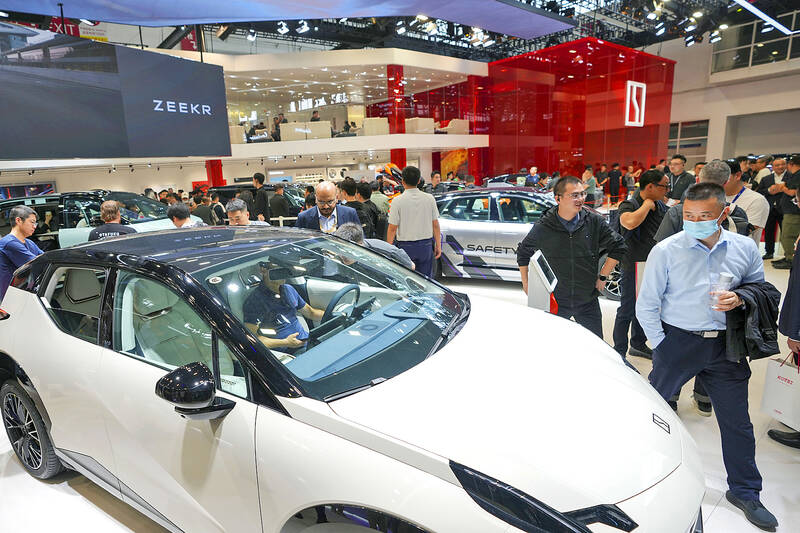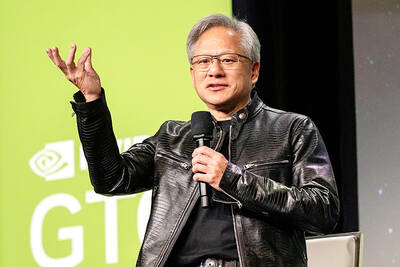The US Department of Commerce today is expected to propose prohibiting Chinese software and hardware in connected and autonomous vehicles on US roads due to national security concerns, two sources said.
US President Joe Biden’s administration has raised concerns about the collection of data by Chinese companies on US drivers and infrastructure as well as the potential foreign manipulation of vehicles connected to the Internet and navigation systems.
The proposed regulation would ban the import and sale of vehicles from China with key communications or automated driving system software or hardware, said the two sources, who declined to be identified because the decision had not been publicly disclosed.

Photo: AP
The move is a significant escalation in the US’ ongoing restrictions on Chinese vehicles, software and components. Earlier this month, the Biden administration locked in steep tariff hikes on Chinese imports, including a 100 percent duty on electric vehicles (EVs) as well as new hikes on EV batteries and key minerals.
US Secretary of Commerce Gina Raimondo in May said that the risks of Chinese software or hardware in connected US vehicles were significant.
“You can imagine the most catastrophic outcome theoretically if you had a couple million cars on the road and the software were disabled,” she said.
The commerce department plans to give the public 30 days to comment before any finalization of the rules, the sources said.
CONNECTED
Nearly all newer vehicles on US roads are considered “connected.” Such vehicles have onboard network hardware that allows Internet access, allowing them to share data with devices both inside and outside the vehicle.
The department also plans to propose making the prohibitions on software effective in the 2027 model year, while the ban on hardware would take effect in January 2029 or the 2030 model year.
The prohibitions in question would include vehicles with certain Bluetooth, satellite and wireless features as well as highly autonomous vehicles that could operate without a driver behind the wheel. The prohibitions would extend to other foreign US adversaries, including Russia, the sources said.
A trade group representing major automakers including General Motors Co, Toyota Motor Corp, Volkswagen AG, Hyundai Motor Co and others had warned that changing hardware and software would take time.
The carmakers said their systems “undergo extensive pre-production engineering, testing, and validation processes and, in general, cannot be easily swapped with systems or components from a different supplier.”
SECURITY
The commerce department declined to comment on Saturday.
Reuters first reported, early last month, details of a plan that would have the effect of barring the testing of autonomous vehicles by Chinese automakers on US roads.
There are relatively few Chinese-made light-duty vehicles imported into the US. The White House on Thursday signed off on the final proposal, which is aimed at ensuring the security of the supply chain for US connected vehicles. It would apply to all vehicles on US roads, but not for agriculture or mining vehicles, the sources said.
Biden said that most cars these days are like “smartphones on wheels,” connected to phones, navigation systems, critical infrastructure and to the companies that made them.

‘DECENT RESULTS’: The company said it is confident thanks to an improving world economy and uptakes in new wireless and AI technologies, despite US uncertainty Pegatron Corp (和碩) yesterday said it plans to build a new server manufacturing factory in the US this year to address US President Donald Trump’s new tariff policy. That would be the second server production base for Pegatron in addition to the existing facilities in Taoyuan, the iPhone assembler said. Servers are one of the new businesses Pegatron has explored in recent years to develop a more balanced product lineup. “We aim to provide our services from a location in the vicinity of our customers,” Pegatron president and chief executive officer Gary Cheng (鄭光治) told an online earnings conference yesterday. “We

It was late morning and steam was rising from water tanks atop the colorful, but opaque-windowed, “soapland” sex parlors in a historic Tokyo red-light district. Walking through the narrow streets, camera in hand, was Beniko — a former sex worker who is trying to capture the spirit of the area once known as Yoshiwara through photography. “People often talk about this neighborhood having a ‘bad history,’” said Beniko, who goes by her nickname. “But the truth is that through the years people have lived here, made a life here, sometimes struggled to survive. I want to share that reality.” In its mid-17th to

LEAK SOURCE? There would be concern over the possibility of tech leaks if TSMC were to form a joint venture to operate Intel’s factories, an analyst said Taiwan Semiconductor Manufacturing Co (TSMC, 台積電) yesterday stayed mum after a report said that the chipmaker has pitched chip designers Nvidia Corp, Advanced Micro Devices Inc and Broadcom Inc about taking a stake in a joint venture to operate Intel Corp’s factories. Industry sources told the Central News Agency (CNA) that the possibility of TSMC proposing to operate Intel’s wafer fabs is low, as the Taiwanese chipmaker has always focused on its core business. There is also concern over possible technology leaks if TSMC were to form a joint venture to operate Intel’s factories, Concord Securities Co (康和證券) analyst Kerry Huang (黃志祺)

‘MAKE OR BREAK’: Nvidia shares remain down more than 9 percent, but investors are hoping CEO Jensen Huang’s speech can stave off fears that the sales boom is peaking Shares in Nvidia Corp’s Taiwanese suppliers mostly closed higher yesterday on hopes that the US artificial intelligence (AI) chip designer would showcase next-generation technologies at its annual AI conference slated to open later in the day. The GPU Technology Conference (GTC) in California is to feature developers, engineers, researchers, inventors and information technology professionals, and would focus on AI, computer graphics, data science, machine learning and autonomous machines. The event comes at a make-or-break moment for the firm, as it heads into the next few quarters, with Nvidia CEO Jensen Huang’s (黃仁勳) keynote speech today seen as having the ability to